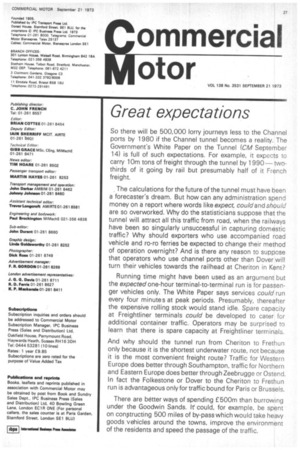Great expectations
Page 29

If you've noticed an error in this article please click here to report it so we can fix it.
So there will be 500,000 lorry journeys less to the Channel ports by 1980 if the Channel tunnel becomes a reality. The Government's White Paper on the Tunnel (CM September 14) is full of such expectations. For example, it expects to carry 10m tons of freight through the tunnel by 1990 — twothirds of it going by rail but presumably half of it French freight.
The calculations for the future of the tunnel must have been a forecaster's dream. But how can any administration spend money on a report where words like expect, could and should are so overworked. Why do the statisticians suppose that the tunnel will attract all this traffic from road, when the railways have been so singularly unsuccessful in capturing domestic traffic? Why should exporters who use accompanied road vehicle and ro-ro ferries be expected to change their method of operation overnight? And is there any reason to suppose that operators who use channel ports other than Dover will turn their vehicles towards the railhead at Cheriton in Kent?
Running time might have been used as an argument but the expected one-hour terminal-to-terminal run is for passenger vehicles only. The White Paper says services could run every four minute s at peak periods. Presumably, thereafter the expensive rolling stock would stand idle. Spare capacity at Freightliner terminals could be developed to cater for additional container traffic. Operators may be surprised to learn that there is spare capacity at Freightliner terminals.
And why should the tunnel run from Cheriton to Frethun only because it is the shortest underwater route, not because it is the most convenient freight route? Traffic for Western Europe does better through Southampton, traffic for Northern and Eastern Europe does better through Zeebrugge or Ostend. In fact the Folkestone or Dover to the Cheriton to Frethun run is advantageous only for traffic bound for Paris or Brussels.
There are better ways of spending 500m than burrowing under the Goodwin Sands. It' could, for example, be spent on constructing 500 miles of by-pass which would take heavy goods vehicles around the towns, improve the environment of the residents and speed the passage of the traffic.
















































































































































































